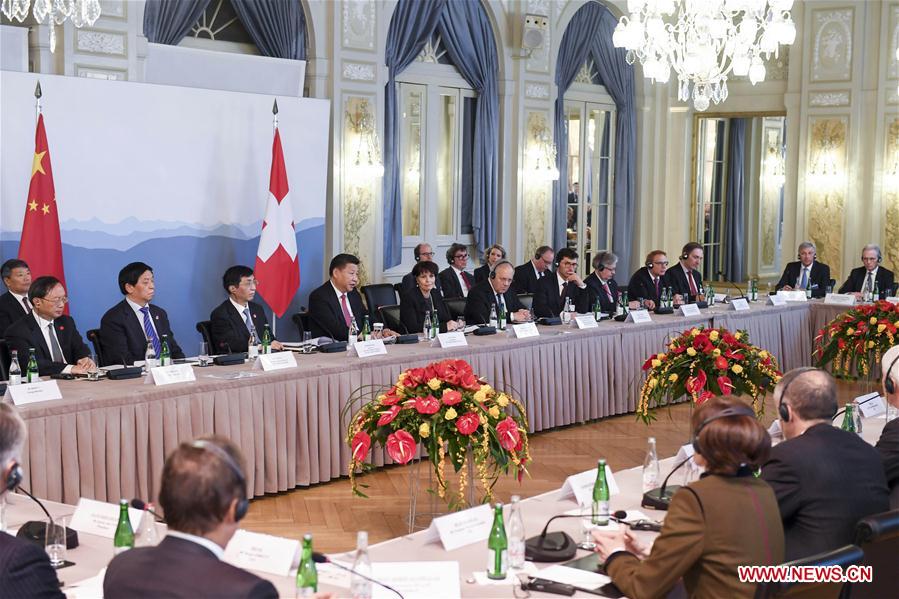By Li Shouen, CCTV.com Panview commentator
Chinese President Xi Jinping arrived in Switzerland for a 4-day state visit on Jan. 15-18. It’s his first overseas trip in 2017 and choosing Switzerland symbolizes his support for globalization. Beijing believes it’s still the best solution to create “inclusive growth” for the international economy.

Chinese President Xi Jinping and his Swiss counterpart Doris Leuthard meet with Swiss business leaders in Bern, Switzerland, Jan. 16, 2017. (Xinhua/Li Xueren)
Switzerland is located in the center of the European Union (EU) and a strong proponent of globalist ideals that favor more open borders, free trade agreements and global governance mechanisms, including the United Nations (UN), World Trade Organization (WTO) and World Health Organization (WHO) with key offices in Geneva.
The landlocked Alpine mountainous nation is also home to the annual meeting of the World Economic Form (WEF) in Davos.
1st-timer at Davos
The WEF is usually seen as the bellwether of the world economy. Amid current situation that globalization is facing challenges from some countries’ trend of turning to trade protectionism, Davos serves a significant political gesture for world leaders to highlight their support for globalist values.
2017 marks the 47th annual meeting at WEF, but this is the first time a Chinese President accepted the invitation, and on Tuesday Xi is scheduled to deliver a keynote opening address.
Xi will lead an 80-member business delegation, which includes Alibaba founder Jack Ma, Dalian Wanda Chairman Wang Jianlin and Baidu Boss Zhang Yaqin.
Xi’s address will encourage participants to stay on the globalization path and to find solutions for recovery of the world economy. He will endorse development and cooperation to construct “a human community of common destiny.”
Opening FTA doors
Beijing holds faith in expanding free trade and investment deals, citing its bilateral ties with Switzerland as proof. Both sides signed a free trade and investment agreement deal in 2014.
Last year, the Swiss government announced the nation’s exports in October and November had slowed down, but export volume to China had witnessed double-digit growth rates, year-on-year in the same period from prior year.
“Such rosy results have led more countries to become interested in free trade talks with China and some of them even asked me for the text of the agreement between China and Switzerland,” China’s ambassador to Switzerland Geng Wenbing told China Daily.
He added, “I am sure that every country that enters such a trade agreement with China will become a winner.”
Amb. Geng explained China is pushing for increased consumption that will increase import trade volumes.
Walking an innovative path
China can no longer rely on the cheap labor to boost exports. Some Chinese factories are moving to southeast Asia and Africa, since manufacturing costs are lower there.
For China to embark on more sustainable economic growth patterns, Beijing is pushing ahead on a nationwide innovation drive to inspire private companies to develop new technologies and upgrade existing ones in the country.
Switzerland stands tall as an innovation Science & Technology hub for the EU, which explains why China and Switzerland have signed on to an “innovative strategic partnership.”
The European nation is world-renowned as a leading innovator in the medical science field. The WHO headquarters is located in Geneva.
Xi is scheduled to make a stop to meet officials at the WHO. China hopes to build more medical science hubs in the country to improve the quality of medical care for those living here.
Rejuvenating globalism
Xi is hoping to revive the “positive energies” of globalism, but we must be aware that globalization is at its crossroads. With some western nations withdrawing from leading the globalization trend, it’s going to be a major challenge for China to carry on the banner.
But Beijing is playing it smart by trying to make it work with yet another try. As Zheng Yongnian, head of the East Asian Institute at the National University of Singapore, mentioned in one of his articles: the current “anti-globalization trend” might be seen as a good opportunity for China.
( The opinions expressed here do not necessarily reflect the opinions of Panview or CCTV.com. )

Panview offers a new window of understanding the world as well as China through the views, opinions, and analysis of experts. We also welcome outside submissions, so feel free to send in your own editorials to "globalopinion@vip.cntv.cn" for consideration.















